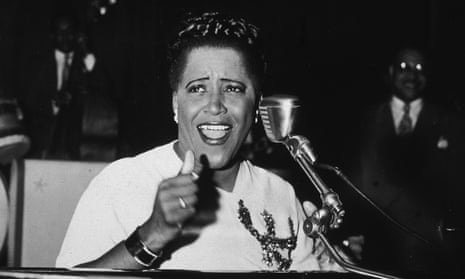Billie Holiday, Ella Fitzgerald … Nellie Lutcher? The three women were close contemporaries in years – Holiday and Lutcher were born just six months apart in 1915 – but not in fame: like so many swing artists of the 1940s and early 50s, Lutcher’s popularity didn’t survive the onslaught of rock’n’roll. Six decades later, pressing play on one of her hits feels like popping the cork on a bottle of sunshine: there is such bright, cheeky verve in her voice as it bounces across a rhythm and lets go of the melody so that notes shoot balloon-like into the sky. This might be why she never reached the heights of fame the way Ella and Billie did: she wasn’t a deep-in-the-soul singer the way they were. She had trained as a pianist: singing was an accident, something she was pestered into by the patrons of LA’s lounge bars, where she was a jobbing player in the 1930s. She bluntly fended them off, until they showed her the extra money that was in it.
That same pragmatism and sureness-of-self beams from her 1947 breakthrough hit, Hurry on Down, one of many songs she wrote herself. “Hurry on down to my house, baby, anybody home but me,” she beckons over a skittery piano line, “Hurry through the alley so the neighbours won’t see.” She’s almost panting with anticipation by the time she reaches the pay-off, voice sharpening up into a reprimand as she declares: “Please come down just as soon as you can / If you can’t I’ll have to call Sam – he’ll hurry on down.” The feminist writer Susan Brownmiller, who first came across Lutcher in 1955, was instantly besotted: what thrilled her, she later wrote in the Village Voice, was Lutcher’s imperiousness, the bold manner in which she was “always on top of the situation”.
It was a confidence born of precocity: Lutcher’s father was a jazz musician, and although he specialised in strings, particularly the bass violin, there was a piano in the house and Nellie started playing it when she was tiny. At the age of eight, she was earning money playing in the local church; at 12, her reputation was such that she was hired by a local hotel to be the backing pianist for the celebrated blues singer Ma Rainey. Two years later, she left school and joined the Imperial Jazz Band – the same group that employed her father. The joy of being able to get on with doing what she loved infuses Lake Charles Boogie, an effervescent number she later composed and dedicated to “the city where I was born”.
Whitney Balliett, the pre-eminent jazz critic of the New Yorker, saw Lutcher play live in New York in 1973, when she enjoyed a brief revival, and wrote admiringly of the way her “city-mouse-and-country-mouse experiences” gave her the dexterous ability to appeal as both an entertainer and a serious musician, one moment playing in “a jangling, down-home, bedspring style”, the next delivering “expert arpeggios and rhythmic bursts”. By that time, performing had drifted into Lutcher’s past: she’d started making money in real estate, and working with the LA branch of the Musicians’ Union (where, one biography notes, she became the first African-American woman to join the board of directors). Balliett wondered if she was on the verge of another major success, but while Lutcher carried on playing into the 1980s, that return to fame wasn’t to be.
She deserves so much more attention than that: for her playfulness and her playing alike. She could be elegant, as in her take on Billie Holiday’s Fine and Mellow, voice dripping honey over rum-coloured trickles of piano; she could be ridiculous but charming, as on The Princess Poo-poo-ly Has Plenty Papaya, saucy to the core but radiating the innocence of a nursery rhyme in its crayon chords. Her voice darts like a hummingbird across Alexander’s Ragtime Band and subsides into sultriness on Fine Brown Frame, a strutting come-on of a song, her fingers lingering over the keys as though testing out the different ways they might touch that fine man’s skin. He’s a Real Gone Guy, another of her own numbers, captures everything great about her: voice and piano slide and skid as she sings of a man whose “technique simply took me out this world”, the pace accelerating as she gets more and more worked up by an excitement that is irrepressible and irresistible.

Comments (…)
Sign in or create your Guardian account to join the discussion